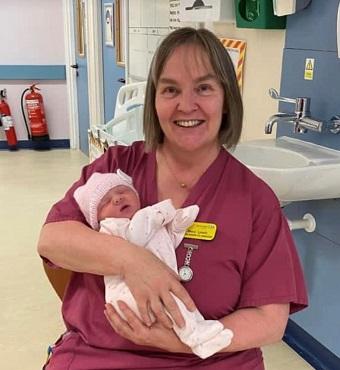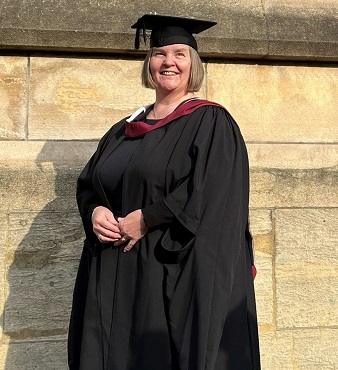
Mary Lynch, Senior Midwife Co-ordinator at NBT, has recently been awarded an MSc. She highlights the realities of pursuing a Master’s while working and balancing her personal life.
My Master's was on non-pharmacological strategies for coping with labour and birth and how they have been evaluated in trials
I explored the effectiveness of methods like hypnobirthing, acupuncture, and other non-medicated pain management strategies. I also conducted qualitative research on healthcare professionals’ views on these strategies and how they integrate them into clinical practice. There wasn’t a lot of research in this area, particularly when looking at randomised controlled trials (RCTs). In my systematic scoping review, I sifted through 15,000 articles and focused on 40 RCTs. That’s not a lot when you consider the vast array of coping mechanisms available.
One of my colleagues suggested I take my research further by pursuing a Master’s degree

I work clinically and my research was funded by the Health Foundation, so I decided to combine the two and go for a Masters as I was already doing the research. I wasn’t something I initially planned to do, but I’m always open to learning and the opportunity was there. I did it for my own personal growth and intellectual challenge rather than career progression. However, for others, a Master’s can be a great stepping stone.
NBT library services were phenomenal
Because my supervisor is based at the University of Bristol (UoB), that’s where most of my support has come from. But I’ve relied on the NBT library services since my first degree, and they’ve always been a great resource. I also attended free study days and training sessions offered by the Clinical Research Network, which were really helpful.
Balancing my studies with work and life was really hard
The workload was enormous. I was working part-time and my supervisor admitted that the expectations were very high. There were moments where I questioned whether I should continue, but I had received public funding and I felt a responsibility to see it through. Despite the challenges, I learned invaluable skills and developed a deeper understanding of research and healthcare.
My son was also doing his Master’s at the same time, and he faced his own challenges. On top of that, my husband was having surgery so that was a difficult year. There were times when my supervisor asked if I wanted to stop, but I was determined to finish. It took me five years in the end because I was juggling so many different things.
My research highlights the importance of informed decision-making for women in labour
Many women aren’t fully aware of all the interventions available, and that can lead to disappointment and even trauma. Increasing awareness and promoting flexible birth plans could make a significant difference. My findings confirmed what I suspected—that the midwife-woman relationship is key. Women need support and flexible birth plans because labour doesn’t always go as expected. When expectations don’t align with reality, it can lead to distress. We need to involve women more in their care decisions and increase awareness about these options.
The biggest challenge I faced was the data analysis
It was intense! Especially the systematic scoping review.
I recently secured a £25,000 grant to study healthcare professionals' views on stillbirth post-mortems and how we counsel women about them.
It’s in the early stages, but I’m excited to get started. I’m in a unique position because I work clinically and do research, which gives me a different perspective.
For someone considering a Master’s I’d advise them to think carefully about why they want to do it
It’s a huge commitment, and you need to be prepared for the workload. Make sure you have a strong support system—friends, family, or even colleagues who can encourage you along the way. And if you’re not tech-savvy, be prepared for some IT challenges. But if you’re determined and have a passion for learning, it’s worth it.
